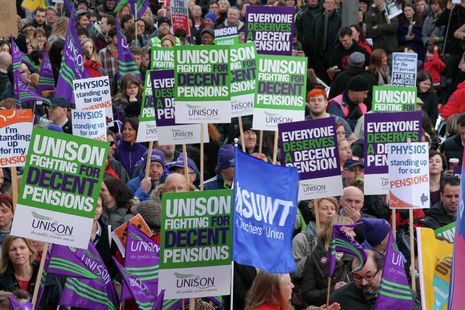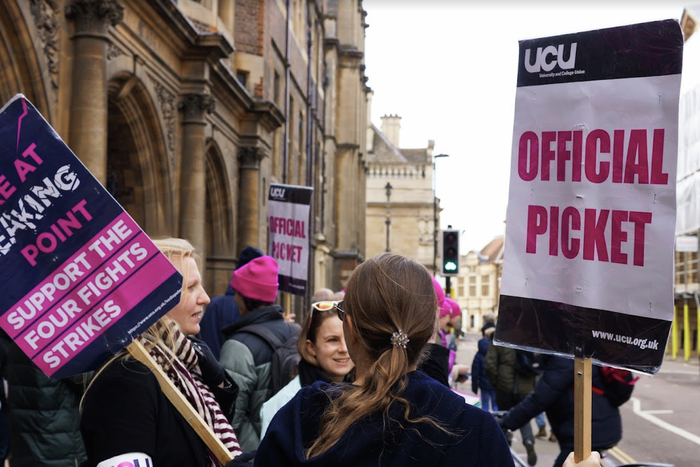The right to strike depends on us mobilising on February 1st
With proposed legislation threatening to undermine public sector strikes, students have a duty to act

On 1 February, over 480,000 workers across the UK will strike in a “day of action” coordinated by the Trades Union Congress (TUC). We’re living through the largest coordinated industrial action in over a decade in response to the worst financial crisis in a generation. We’re all familiar with the reasons why: wages are stagnating, prices and bills are soaring, while the private companies sucking the lifeblood out of our public services are reporting record profits. During a cost of living crisis many workers are being offered a pay slash – often as much as 10% below RPI inflation (a metric which accounts for housing costs). Now, after a summer of escalating strikes, the government has made it very clear whose side they’re on, voicing support for employers and demonising those striking for their livelihood.
It’s not just words though. In addition to financially supporting bosses, the government is pursuing a vicious attack on the right to strike itself, in a country which already has some of the most repressive trade union laws in Europe. The legislation proposed by the Tories this month would all but criminalise striking across the public sector, imposing “minimum service levels” which, if not met, would legally allow employers to fire striking employees and sue unions. These anti-strike laws would enforce a public sector in which workers – who not long ago were labelled as “key” – would be locked into unliveable wages and ever-deteriorating conditions created by privatisation, bureaucracy and cuts. Research published by the TUC last year revealed that a third of public sector key workers were already considering leaving their profession or had already tried to leave.
“‘Public services’ are not just ‘nice-to-have’ programmes we can all enjoy, they’re what enables a ‘we’ at all”
The workers under attack – teachers, nurses, rail workers, civil servants – are those who, as the pandemic demonstrated, protect our ability to live in dignity and to live in community. “Public services” are not just “nice-to-have” programmes we can all enjoy, they’re what enables a “we” at all. Unions do not exist solely to ensure pay rises in line with inflation, they are an acknowledgement that “an injury to one is an injury to all”: unless workers stand together, across sectors, every drop of public life can be extracted from the veins of communities and deposited into the pockets of a wealthy minority. Strikes helped to win weekends, sick pay, every shred of freedom we have in our working lives, and freedoms which are still not available to all workers. The labour movement is a continual struggle for dignity for all.
The government seeks to all but criminalise the very basis of this struggle and turn back the clock on workers’ rights. We should not be timid in saying that the anti-strike laws are an attack on society, and therefore we must resist this attack with everything we’ve got. If you believe in the right to strike, then this strike – and the strikes to come – shouldn’t just be a matter of principle. Supporting these strikes means actively participating.
“To support these strikes only in theory or refuse to commit to a position is to extend or weaken the strikes”
It’s all well and good to say “students should support the strikes”, but what does this look like? It’s certainly not just writing a righteous Varsity article, or trying to win an argument with someone from another political camp. Supporting the strikes in its most fundamental form means showing up, whenever you can, however you can. It’s easy for me to say “stand with strikers” and forget the material implications of this statement. Picket lines are not just a box-tick for striking or a press exercise for people to walk past: they are a tactic for winning disputes. The power of a union is possible only if the “all” show up to defend the “one” – which on 1st February is 480,000 teachers, lecturers, civil servants and train drivers.
The old adage is true: “the longer the picket, the shorter the strike”. With the engines of government, the tycoons suffocating our public services, and a floundering parliamentary opposition seemingly bent on destroying – or, at best, ignoring – workers’ rights, we’re going to need a long picket. Yes, strikes are disruptive, and educators and students, workers and passengers, are all tired of this disruption. But striking is about learning from and leaning on one another. Striking is staking your hopes to the power of a union, the power of the people to be more than load-bearing cogs in a profit machine. It’s a risk, and losing pay is not a decision to be taken lightly. To support these strikes in theory, or refuse to commit to a position, is to belittle this decision, and to extend or weaken the strike. If we don’t nurture the hope which fuels the labour movement, we’ll have no collective power – and no material mechanism – to make a better world for everyone.
Have a different view?
Write for Varsity and have your say. Just email our Comment team with a 100-word pitch.
So 1 February is more than a day of action: it’s make or break. The last time there was a coordinated strike in Cambridge, in 2011, 4000 people took to the streets. We must mobilise on a greater scale. There are plenty of ways to support strikers: bringing baked goods, a banner, financial support, your saxophone, megaphone, and as many friends, relatives and distant acquaintances as you can persuade. Whatever solidarity you can share, share it. This day of action is only the first step in resisting anti-strike legislation, but we must start as we mean to go on: together, participating, hopeful.
 News / Clare Hall spent over £500k opposing busway 24 December 2025
News / Clare Hall spent over £500k opposing busway 24 December 2025 News / Caius mourns its tree-mendous loss23 December 2025
News / Caius mourns its tree-mendous loss23 December 2025 Comment / The ‘class’ of Cambridge24 December 2025
Comment / The ‘class’ of Cambridge24 December 2025 Comment / Yes, I’m brown – but I have more important things to say22 December 2025
Comment / Yes, I’m brown – but I have more important things to say22 December 2025 Interviews / Politics, your own way: Tilly Middlehurst on speaking out21 December 2025
Interviews / Politics, your own way: Tilly Middlehurst on speaking out21 December 2025










